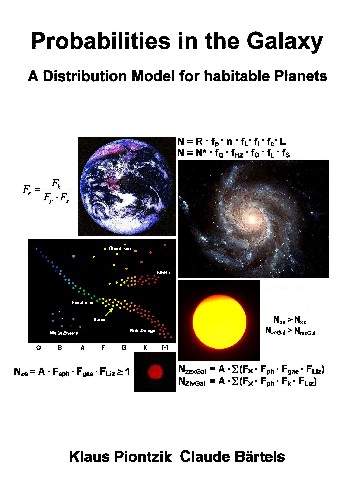 |
Analogous to
the previous Special Basic Model we can
generalize the equations 3.1.1 and 3.3.4 for
habitable "Earths 2" in sun-like
systems so that they apply to general star
systems with habitable, earth-like planets: |
| |
|
| 8.3.1 Equation |
Nhex
= Nphx
· Fgae
Nhex
= A · FX ·
Fph ·
Fgae |
The number of NhexGal
of all star systems with habitable, earth-like
planets in the galaxy is then the sum of all spectral
classes:
| 8.3.2 Equation |
NhexGal
= ∑ Nhex
= A · ∑ (FX ·
Fph ·
Fgae) |
Assuming that the
other star systems, i.e. not sun-like stars, also have
the same or similar planetary distribution, it is
possible to estimate how many systems with habitable
"Earths 2" could exist.
| 8.3.3 Approach |
In star systems that are not
sun-like, there are probably the same or similar
distributions, for earth-like habitable planets,
as in sun-like systems. |
The number NhexGal
of all star systems with habitable, earth-like
planets in the galaxy (∑ Fx = 1), is
approximately equivalent to:
| 8.3.4 Equation |
NhexGal
= ∑ Nhex
≈ A · Fph ·
Fgae |
Inserting all values
(Fe = 0.1) into equation 8.3.4:
NhexGal1 = (100-300)·109 · 1:4200
· 1:69
NhexGal1 = 345,065 –
1,035,196 habitable „Earth 2“
Inserting all values (Fe = 0,01) into equation
8.3.4:
NhexGal2 = (100-300)·109 · 1:4200
· 1:691
NhexGal2 = 34,456 –
103,370 habitable „Earth 2“
The two results can then be summarized to the following
statement::
| 8.3.5 Theorem |
There
could be between 34,000 and 1,035,000 Earths 2 in
our galaxy. |
| |
|
| 8.3.6 Theorem |
There
could be a maximum of up to 1 million
"Earths 2" in our galaxy. |
The probability for habitable,
earth-like planets in any star system, in the galaxy, is
then:
:
| 8.3.7 Definition |
FhexGal
= Fph ·
Fgae
FhexGal
= Fp ·
Fh ·
Fg ·
Fa ·
Fe |
FhexGal = Fph · Fgae
FhexGal = 1:4200 · (1:69–1:691)
FhexGal
= 1:289,800 – 1: 2,902,200
Only every 289,800 - 2,902,200th star
system produces an earth-like planet, in the habitable
zone.
It is left to the reader for practice to make the
calculations for planets with life and intelligence
himself. Otherwise, see the table at the end of the book
(page 137).
|
